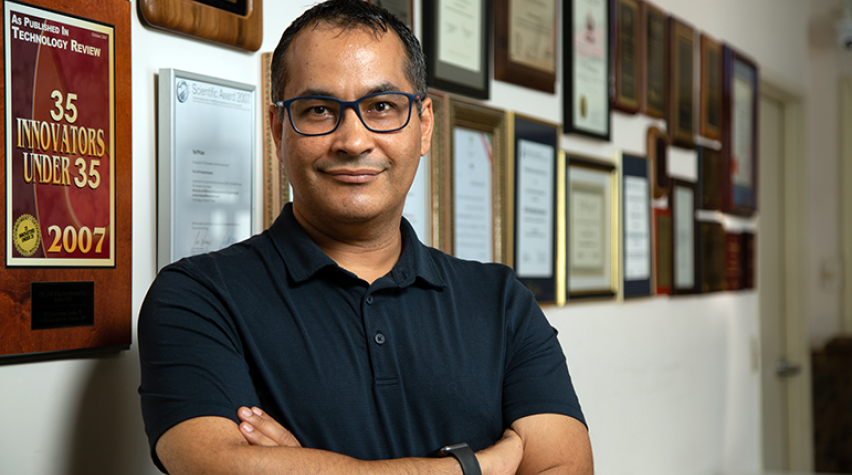
Ali Khademhosseini
ChEnected is introducing readers to the recipients of AIChE’s 2024 Institute and Board of Directors’ Awards. These high honorees are nominated by the chemical engineering community and voted upon by the members of AIChE’s Awards Committee.
The Andreas Acrivos Award for Professional Progress in Chemical Engineering is endowed by the AIChE Foundation in the name of fluid-dynamics pioneer Andreas Acrivos of the City College of New York. The prize recognizes outstanding progress in chemical engineering by a member of AIChE in their early career.
The recipient of the 2024 Acrivos Award for Professional Progress is Ali Khademhosseini, the CEO and Founding Director of the Terasaki Institute for Biomedical Innovation.
Dr. Khademhosseini is being recognized “for the application of chemical engineering principles to development and use of micro- and nano-engineered biomaterials in regenerative medicine, medical devices, and organs-on-a-chip systems.” He and the other Institute and Board of Directors’ Award recipients will be honored at the 2024 AIChE Annual Meeting, October 27–31 in San Diego, California.
Throughout my career, I have believed in ‘innovation through collaboration’ — that interdisciplinary teamwork is essential for tackling complex biomedical challenges.
About Ali Khademhosseini and his work
Ali Khademhosseini has advanced bioengineering through his work with biomaterials. His innovations in tissue engineering, including 3D bioprinting and hydrogel-based systems, have paved the way for functional tissue and organ-on-chip models. These contributions have not only enhanced the understanding of tissue regeneration and disease modeling but have also facilitated the development of personalized medicine and more-effective treatment strategies. He has documented this work in more than 750 peer-reviewed journal articles and more than 50 patents and patent applications.
Before establishing the Terasaki Institute, Khademhosseini was a professor of bioengineering, chemical engineering, and radiology at the University of California, Los Angeles. Prior to UCLA, he was on the faculty of the Harvard Medical School and the Harvard-MIT Division of Health Sciences and Technology at Brigham and Women’s Hospital.
Khademhosseini says that, as a bioengineer, he has been driven by the idea that the convergence of engineering and biology can lead to groundbreaking advancements in medicine. “My work has focused on developing micro- and nano-engineered biomaterials for regenerative medicine, aiming to bridge the gap between scientific discovery and clinical application,” he says. “Throughout my career, I have believed in ‘innovation through collaboration’ — that interdisciplinary teamwork is essential for tackling complex biomedical challenges.”
Views on the future of chemical engineering
Looking to the future, Khademhosseini believes that the contributions of chemical engineers will be more critical than ever. “As we face global health challenges, from pandemics to chronic diseases, chemical engineers will play a pivotal role in developing innovative solutions that improve healthcare outcomes,” he says. “Our expertise in designing and optimizing complex systems will be crucial. And, by leveraging our skills in both engineering and biology, we have the opportunity to transform healthcare, making it more personalized, efficient, and accessible.”
He concludes, “It is my hope that future generations of chemical engineers will continue to push the boundaries of what is possible, fostering a world where advanced biomedical technologies can enhance the quality of life for all.”
Dr. Khademhosseini is a Fellow of the American Institute of Medical and Biological Engineering, the Biomedical Engineering Society, the Royal Society of Chemistry, the Materials Research Society, and the American Association for the Advancement of Science, among many affiliations. He is also a member of the International Academy of Medical and Biological Engineering, the Royal Society of Canada, the Canadian Academy of Engineering, and the U.S. National Academy of Inventors.
He received his PhD in bioengineering from MIT, and his MS and BS degrees in chemical engineering from the University of Toronto.
This fall, ChEnected is presenting profiles of all the 2024 Institute and Board of Directors’ Award recipients. Visit ChEnected regularly to meet the honorees.


